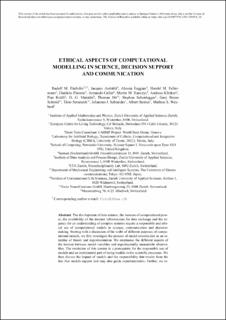Please use this identifier to cite or link to this item:
https://doi.org/10.21256/zhaw-27312| Publication type: | Conference paper |
| Type of review: | Peer review (publication) |
| Title: | Ethical aspects of computational modelling in science, decision support and communication |
| Authors: | Füchslin, Rudolf Marcel Ambühl, Jacques Faggian, Alessia Fellermann, Harold M. Flumini, Dandolo Geller, Armando Hanczyc, Martin M. Klinkert, Andreas Krütli, Pius Matuttis, Hans-Georg Ott, Thomas Scheidegger, Stephan Schmid, Gary Bruno Smieszek, Timo Schneider, Johannes J. Steiner, Albert Weyland, Mathias S. |
| et. al: | No |
| DOI: | 10.1007/978-3-031-23929-8_24 10.21256/zhaw-27312 |
| Proceedings: | Artificial Life and Evolutionary Computation |
| Conference details: | XV Italian Workshop on Artificial Life and Evolutionary Computation (WIVACE), Winterthur, Switzerland, 15-17 September 2021 |
| Issue Date: | 22-Jan-2023 |
| Series: | Communications in Computer and Information Science |
| Series volume: | 1722 |
| Publisher / Ed. Institution: | Springer |
| Publisher / Ed. Institution: | Cham |
| ISBN: | 978-3-031-23928-1 978-3-031-23929-8 |
| Language: | English |
| Subjects: | Ethics; Computational modelling; Transdisciplinarity |
| Subject (DDC): | 003: Systems |
| Abstract: | The development of data science, the increase of computational power, the availability of the internet infrastructure for data exchange and the urgency for an understanding of complex systems require a responsible and ethical use of computational models in science, communication and decision-making. Starting with a discussion of the width of different purposes of computational models, we first investigate the process of model construction as an interplay of theory and experimentation. We emphasise the different aspects of the tension between model variables and experimentally measurable observables. The resolution of this tension is a prerequisite for the responsible use of models and an instrumental part of using models in the scientific processes. We then discuss the impact of models and the responsibility that results from the fact that models support and may also guide experimentation. Further, we investigate the difference between computational modelling in an interdisciplinary science project and computational models as tools in transdisciplinary decision support. We regard the communication of model structures and modelling results as essential; however, this communication cannot happen in a technical manner, but model structures and modelling results must be translated into a “narrative.” We discuss the role of concepts from disciplines such as literary theory, communication science, and cultural studies and the potential gains that a broader approach can obtain. Considering concepts from the liberal arts, we conclude that there is, besides the responsibility of the model author, also a responsibility of the user/reader of the modelling results. |
| URI: | https://digitalcollection.zhaw.ch/handle/11475/27312 |
| Fulltext version: | Accepted version |
| License (according to publishing contract): | Licence according to publishing contract |
| Departement: | Life Sciences and Facility Management School of Engineering |
| Organisational Unit: | Institute of Applied Mathematics and Physics (IAMP) Institute of Computational Life Sciences (ICLS) Institute of Data Analysis and Process Design (IDP) |
| Published as part of the ZHAW project: | ACDC – Artificial Cells with Distributed Cores to Decipher Protein Function |
| Appears in collections: | Publikationen School of Engineering |
Files in This Item:
| File | Description | Size | Format | |
|---|---|---|---|---|
| 2023_Fuchslin-etal_Ethical-aspects-of-computational-modelling_WIVACE.pdf | Accepted Version | 1.01 MB | Adobe PDF |  View/Open |
Show full item record
Füchslin, R. M., Ambühl, J., Faggian, A., Fellermann, H. M., Flumini, D., Geller, A., Hanczyc, M. M., Klinkert, A., Krütli, P., Matuttis, H.-G., Ott, T., Scheidegger, S., Schmid, G. B., Smieszek, T., Schneider, J. J., Steiner, A., & Weyland, M. S. (2023, January 22). Ethical aspects of computational modelling in science, decision support and communication. Artificial Life and Evolutionary Computation. https://doi.org/10.1007/978-3-031-23929-8_24
Füchslin, R.M. et al. (2023) ‘Ethical aspects of computational modelling in science, decision support and communication’, in Artificial Life and Evolutionary Computation. Cham: Springer. Available at: https://doi.org/10.1007/978-3-031-23929-8_24.
R. M. Füchslin et al., “Ethical aspects of computational modelling in science, decision support and communication,” in Artificial Life and Evolutionary Computation, Jan. 2023. doi: 10.1007/978-3-031-23929-8_24.
FÜCHSLIN, Rudolf Marcel, Jacques AMBÜHL, Alessia FAGGIAN, Harold M. FELLERMANN, Dandolo FLUMINI, Armando GELLER, Martin M. HANCZYC, Andreas KLINKERT, Pius KRÜTLI, Hans-Georg MATUTTIS, Thomas OTT, Stephan SCHEIDEGGER, Gary Bruno SCHMID, Timo SMIESZEK, Johannes J. SCHNEIDER, Albert STEINER und Mathias S. WEYLAND, 2023. Ethical aspects of computational modelling in science, decision support and communication. In: Artificial Life and Evolutionary Computation. Conference paper. Cham: Springer. 22 Januar 2023. ISBN 978-3-031-23928-1
Füchslin, Rudolf Marcel, Jacques Ambühl, Alessia Faggian, Harold M. Fellermann, Dandolo Flumini, Armando Geller, Martin M. Hanczyc, et al. 2023. “Ethical Aspects of Computational Modelling in Science, Decision Support and Communication.” Conference paper. In Artificial Life and Evolutionary Computation. Cham: Springer. https://doi.org/10.1007/978-3-031-23929-8_24.
Füchslin, Rudolf Marcel, et al. “Ethical Aspects of Computational Modelling in Science, Decision Support and Communication.” Artificial Life and Evolutionary Computation, Springer, 2023, https://doi.org/10.1007/978-3-031-23929-8_24.
Items in DSpace are protected by copyright, with all rights reserved, unless otherwise indicated.